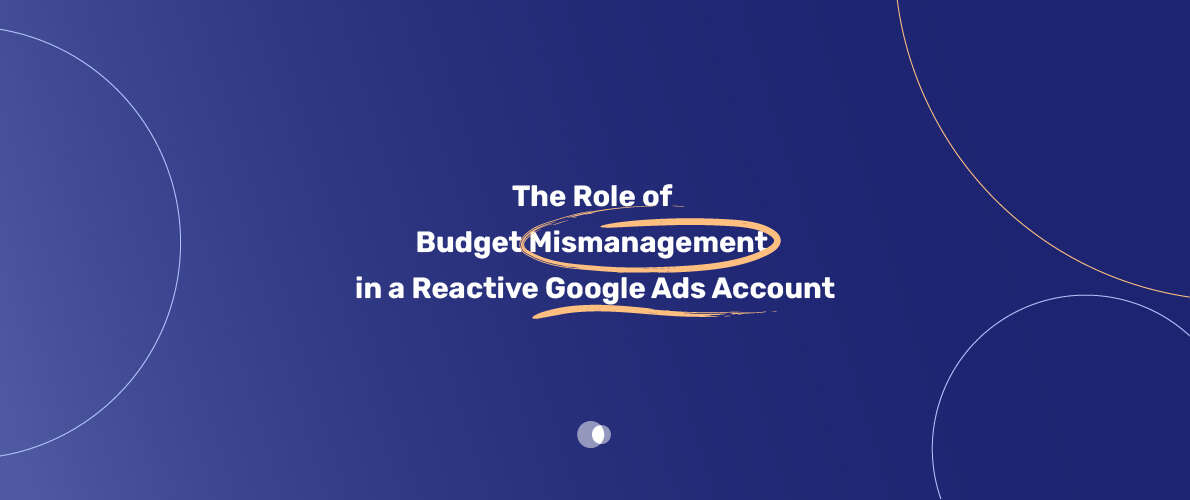Managing your Google Ads account well is key to reaching your goals. A reactive approach can lead to poor budget use, hurting your ROI and performance. To avoid this, focus on optimizing your Google Ads budget and managing it proactively. Partnering with a google ads certified agency can significantly improve your budget strategy and campaign results.
Table of Contents
Good Google Ads budget optimization is vital for your campaign’s success. Understanding the need for proactive budget management helps you avoid reactive mistakes. This way, you can stay competitive.

Reactive management can make you fall behind, so it’s crucial to manage your Google Ads budget proactively. This ensures your campaigns work hard for the best ROI and performance.
Key Takeaways
- Proactive Google Ads budget optimization is crucial for achieving campaign goals
- Reactive account management can lead to budget mismanagement and decreased ROI
- Effective budget management strategies can help you stay ahead of the competition
- Google Ads budget optimization is essential for maximizing campaign performance
- A proactive approach to budget management can help you avoid common pitfalls
- By focusing on proactive management, you can ensure maximum ROI and performance metrics
Understanding Budget Mismanagement in a Reactive Google Ads Account
Managing your Google Ads account well means knowing what a reactive account is. It also means spotting signs of budget problems. A reactive account isn’t managed well, leading to bad campaign results and less ROI. Look for signs like uneven ad spending, low-quality ad spots, and bad targeting. In such cases, some businesses even choose to buy google agency account to work with optimized, pre-verified accounts.
It’s key to manage your budget well to avoid these problems. Regularly check your account and tweak it when needed. This helps your campaigns perform better and boosts ROI. Common budget mismanagement signs include:
- Spending too much on ads
- Not using ad budgets fully
- Bad ad targeting and placement
These issues hurt your campaign’s performance, reducing ads and ROI. With proactive budget management, you can dodge these traps and make your Google Ads account better.

Knowing the signs of budget mismanagement and being proactive with your Google Ads account helps. You’ll see better campaign results, more ROI, and better ad effectiveness overall.
Key Factors Contributing to Poor Budget Management
Managing your Google Ads account well is all about budget forecasting. It helps you use your advertising opportunities wisely. Without good budget management, you might waste money and see less return on your investment.
To fix this, you need to know what goes wrong. The main issues are:
- Lack of clear campaign objectives
- Inadequate tracking systems
- Insufficient budget forecasting
Understanding these problems lets you improve your budget forecasting. You can set clear goals, track your spending well, and check your budget often. This keeps it in line with your aims.

Being proactive with your budget can make your Google Ads work better. Good budget forecasting is essential. It helps you use your advertising opportunities fully and succeed in your campaigns.
The Hidden Costs of Reactive Account Management
Exploring Google Ads reveals hidden costs of reactive account management. You might know about ad spend and management fees. But, there are other costs that can hurt your budget and campaign performance. Using proactive budget management strategies helps avoid these costs and boosts your campaigns. In critical situations, quick Google Ads suspension recovery becomes vital to resume campaign operations without losing significant ad spend.
Reactive account management’s hidden costs include lost ad opportunities, lower ROI, and performance issues. These can quickly add up, making it hard to reach your marketing goals. With tracking systems, you can spot where you’re losing out and make better decisions for your campaigns.
- Regularly review your campaign performance to identify areas for improvement
- Implement tracking systems to monitor your ad spend and campaign metrics
- Develop a proactive budget management strategy to optimize your campaigns and avoid lost opportunities
By being proactive with your budget, you can dodge the hidden costs of reactive management. This approach helps you get more from your Google Ads campaigns. Remember, proactive budget management is crucial for maximizing your marketing budget’s potential.
Assessing Your Current Budget Allocation Strategy
To better your budget optimization, you need to check your current budget plan. Look at your campaign performance and find ways to get better. Start by looking at your past campaigns and see what did well and what didn’t.
When checking your budget plan, think about these things:
- Cost per conversion
- Return on ad spend (ROAS)
- Click-through rate (CTR)
- Conversion rate
By regularly checking and tweaking your budget plan, you can do better in your campaign performance. This is a never-ending task that needs constant watching and adjusting to get the best from your budget.
Remember, budget optimization is key to winning in marketing. By following these steps and always watching your campaign performance, you can make sure you’re using your budget wisely and hitting your marketing targets.
| Campaign Metric | Target Value | Actual Value |
| Cost per conversion | $10 | $12 |
| ROAS | 300% | 250% |
| CTR | 2% | 1.5% |
Creating a Proactive Budget Management Plan
To get the most out of Google Ads, you need a solid plan. Start by setting clear goals for your campaigns. This will help you use your budget wisely and make the most of your Google Ads.
Here are some steps to follow:
- Know who you want to reach and what you want to achieve with your ads
- Make budget forecasts that match your business goals
- Use tracking systems to keep an eye on how your ads are doing and make smart choices
Managing your budget well is key to getting a good return on investment (ROI). Regularly check how you’re spending your budget and adjust as needed. This keeps your Google Ads campaigns running smoothly and helps you stay competitive.
Remember, budget management is an ongoing task. Keep watching how your campaigns are doing and tweak your budget to get better results. This way, you can boost your conversions, increase your sales, and grow your business.
Tools and Technologies for Better Budget Control
Improving your budget forecasting and tracking is key. There are many tools and technologies to help you. Google Ads tools can monitor and control your budget. Or, you might prefer third-party solutions with more features.
For budget forecasting, you need tools that predict expenses and revenues. Accurate forecasting helps in making smart budget decisions. Google Ads’ forecasting tool uses machine learning. Third-party software offers a detailed budget view for better decisions.
Google Ads has a budget tracking feature for alerts. Third-party apps provide a detailed budget view for adjustments.
Google Ads Built-in Tools
- Google Ads’ built-in forecasting tool
- Google Ads’ budget tracking feature
Third-party Budget Management Solutions
- Budget management software
- Budget management apps
Using these tools can enhance your budget management. Choose the right tools for your needs. Experiment to find the best fit for you.
Optimizing Campaign Settings for Budget Efficiency
To boost your campaign’s performance, it’s key to tweak your settings. This means checking and changing them often to match your budget targets. Doing this can lead to big gains in ROI and better campaign results.
When you’re fine-tuning your campaign settings, think about a few important things:
- Ad targeting and placement
- Bid strategy and budget allocation
- Ad scheduling and rotation
These elements greatly affect how well your campaigns do and your ROI. By tweaking these settings, you can make sure your campaigns work well and efficiently.
It’s also vital to do regular campaign checks. Looking at your campaign data and how it’s doing helps you spot what needs work. This way, you can make smart choices to improve your campaign’s performance and ROI.
By using these tips and best practices, you can make your campaign settings more budget-friendly. Always check and tweak your settings to keep them in line with your budget goals and plans.
Measuring and Monitoring Budget Performance
To keep your Google Ads account running well, it’s key to check budget performance often. You need to watch important performance indicators (KPIs) to see how your campaigns are doing. This helps you spot where you can get better and make smart budget choices.
Managing your budget well is vital for getting the most out of your investment. By keeping an eye on your budget, you can spot trends that might affect your campaign. This lets you tweak your budget plan to make sure your ads reach the right people and get results.
Key Performance Indicators to Track
- Cost per conversion
- Conversion rate
- Click-through rate (CTR)
- Cost per click (CPC)
Tracking these KPIs helps you understand your campaign’s success better. It’s all about making smart budget choices to hit your marketing targets and boost your ROI.
Creating Performance Reports
It’s smart to make performance reports often to keep track of your budget. These reports should have important numbers like KPIs, how much you’ve spent, and ROI. Looking at these reports helps you fine-tune your budget strategy and keep your campaigns on track.
Good budget management is crucial for your Google Ads campaigns to succeed. By watching your budget closely, you can make sure your campaigns are working well and bringing in results. With smart budget management, you can stay ahead and meet your marketing goals.
Conclusion: Moving from Reactive to Proactive Budget Management
Shifting from a reactive to a proactive approach to Google Ads budget optimization can greatly improve your campaign’s performance. You can manage your advertising expenses better and achieve better results. This change helps you take control of your spending and get more out of your marketing efforts.
Effective budget management starts with clear goals and accurate budget forecasts. It also involves tracking your performance closely. Using tools like Google Ads and third-party solutions can help you manage your spending better and increase your return on investment.
By adopting a proactive budget management approach, you can open up new opportunities and improve your marketing strategies. This shift not only boosts your campaign’s performance but also helps your business grow and succeed.
FAQs
What is a reactive Google Ads account?
A reactive Google Ads account doesn’t manage its budget well. This leads to poor campaign results and less return on investment (ROI).
How can I identify if my Google Ads account is reactive?
Look out for signs like sudden budget use up and poor campaign results. Also, check if you’re missing out on ads. Reviewing your budget and tracking systems can show if your account is reactive.
What are the consequences of budget mismanagement in a reactive Google Ads account?
Mismanaging your budget can hurt your ROI and campaign success. You might also fall behind in the market. This makes it hard to reach your business goals.
What are the key factors that contribute to poor budget management?
Not forecasting your budget and not tracking well are big problems. Without clear budget and performance data, making smart choices is tough.
How can I assess my current budget allocation strategy?
Check your campaign data and find areas to improve. Adjust your budget based on this. Regular reviews and data-driven choices are key to better budget use.
What tools and technologies can help me better control my Google Ads budget?
Google Ads has tools like bidding strategies for budget control. There are also third-party solutions for better forecasting and tracking.
How can I optimize my campaign settings for budget efficiency?
Tweak your campaign settings, like bids and targeting, for better budget use. Regular audits and data-driven choices are vital for improving your campaigns.
What key performance indicators should I track to measure and monitor my budget performance?
Watch CPC, CTR, conversion rate, and ROAS. Use these to make reports and adjust your strategies. This helps manage your budget and improve campaign results.



